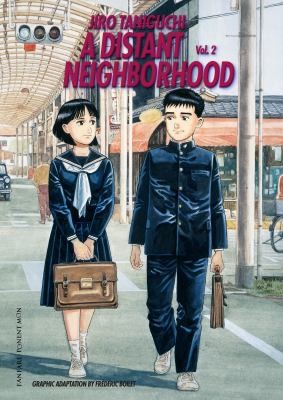Literally Graphic reviewed A Distant Neighborhood by Jiro Taniguchi (A Distant Neighborhood, #2)
Review of 'A Distant Neighborhood' on 'Goodreads'
3 stars
And today we are tackling A Distant Neighbourhood volumes 1 & 2 by Jiro Taniguchi. I originally read this duology back in my university days, as part of the first ever Graphic Novels as Literature Class, and have meant to re-read them ever since. This duology was published in English by Ponent Mon Ltd in 1998, flipped by the author's permission they are quick to note in the back of the book.
As far as warnings go, I would point out that there are some examples of under age drinking to the point of passing out and, for better or for worse, the entire plot line centres around the idea of men leaving their families. Not a typical warning, but it's the entire thing in a nut shell so I figured I would let you know asap! Also some flash back scenes to World War II.
Strangely enough, after all this procrastination I picked up quite a few Jiro Taniguchi manga before the library shut down for Covid-19 so this is the first in what will likely become a bit of a series. So to start a creator bio, Taniguchi began his career as an assistant of manga artist Kyuuta Ishikawa. He made his manga debut in 1970 with A Desiccated Summer, published in Young Comic. Taniguchi then went on to write some titles that could be described as "hard-boiled", followed by he collaborated with Garon Tsuchiya, illustrated work by Baku Yumemakura and created the Ikaru series with texts by Moebius. Throughout his life (1947 - 2017) Taniguchi won several awards including Osamu Tezuka Culture Award (1998) and the Shogakukan prize (2003).
Turning the book over, how does it describe itself? "Who hasn't thought about reliving their past, correcting perceived mistakes or changing crucial decisions? Would this better your life or the lives of those closest to you? or would your altered actions prove even more harmful? One man gets the chance to find out...
Middle-aged Hiroshi Nakahara is on his way home from a business trip when he finds himself on the wrong train heading for his childhood hometown. His footsteps take him to his mother's grave and it's there that he is catapulted back into his life as an 8th grader - but with all his adult memories and knowledge intact. As he struggles to make sense of his predicament his adult memories of his childhood return but are somehow subtly changed. The questions start to form ... would his father still disappear without explanation? would he still marry his wife?"
This duology (sorry, I really like that word) has also been adapted into a live-action film by Sam Garbarski, a Belgium director, that was released in 2010.
Talking about my own feelings about this series, I must admit to being a bit torn. On the one hand when I originally read this I was feeling very nostalgic for my earlier life (I don't feel it as much anymore, but still appreciate the mood). On the other hand I did get a bit inpatient about 2/3rds of the way through, because I do feel a bit judgy about men randomly leaving their family. The end did twist around into something satisfactory though. It probably also doesn't hurt that I often felt like an adult stuck in a kid's body growing up.
As far as sexuality and gender goes, it's all pretty nondescript. A somewhat dated book that jumps even further back in time. 95% of the book is focused on heterosexual relationships. I didn't catch onto anything actually queer phobic but, as I mentioned, it got a bit tiring by the end. The gender binary is alive and well and "women" do "womanly things".
Not exactly class, but something that does play a big role in this series is the power of familial expectation and social rules. Particularly when Nakahara is explaining his family history and ends up traveling back through time, in contrast to Nakahara's own coming of age and adulthood. In general Nakahara's family seems to be doing well enough to get by but not ostentatiously. It is noted several times, however, how hard his mother had to work after his father left.
Writing up this review I have a nagging feeling that something happens to one of Nakarahara's friends off page that results in a passing comment on disability, but I can't find it back. So the only other thing that relates to ability vs disability is the way Nakahara's elderly grandmother effects his parent's lives. Hmmm, while they certainly love the grandmother, that doesn't really add up to particularly positive representation.
Like many manga in particular, race is not really touched on.

